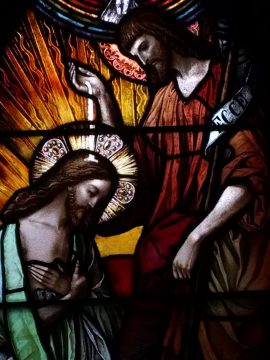Celebrating the Baptism of the Lord, we offer a Franciscan Gospel reflection and questions written by Fr. Paul Gallagher, OFM for your prayer. They are edited by Franciscan Sister of Christian Charity Sister Anne Marie Lom and Joe Thiel. The excerpts from the Sunday readings are prepared by Joe Thiel. To read or download the complete pdf with excerpts for your prayer, please click here: Franciscan Gospel Reflection January 12 2020. Excerpts are from the Lectionary for Mass for Use in the Dioceses of the United States of America, second typical edition © 2001, 1998, 1997, 1986, 1970 Confraternity of Christian Doctrine, Inc., Washington, DC. Used with permission. All rights reserved. No portion of this text may be reproduced by any means without permission in writing from the copyright owner. Photo: St. John the Baptist, Holy Name, Sheboygan, Wisconsin and St. John, Waunakee, Wisconsin
Matthew 3:13-17
Then Jesus came from Galilee to John at the Jordan to be baptized by him.
John tried to prevent him, saying, “I need to be baptized by you, and yet you are coming to me?” Jesus said to him in reply, “Allow it now, for thus it is fitting for us to fulfill all righteousness.” Then he allowed him.
After Jesus was baptized, he came up from the water and behold, the heavens were opened for him, and he saw the Spirit of God descending like a dove and coming upon him. And a voice came from the heavens, saying, “This is my beloved Son, with whom I am well pleased.”
Background:
The fact that each of the four gospels contains a record of the Baptism of Jesus indicates how important this event in the life of Jesus was for the early Christian community. (Mt 3:13-17, Mk 1:9-11, Lk 3:21-22, and John 1:31-34). Jesus’ baptism by John was also problematic. If Jesus was the messiah and more significant than John, then why did he submit to being baptized by him? Also, if John’s baptism was a baptism of repentance, why would Jesus come to John to be baptized?
The culture of their time was based on maintaining one’s place and dignity within the community. An essential part of this was keeping an appropriate distance from those who were subordinate. Also, there were those who maintained that The Baptist was the bearer of God’s final revelation. By submitting to John’s baptism, Jesus seemed to acknowledge John’s superiority.
Scripture scholars believe that Matthew had knowledge of Mark’s Gospel. By looking at how Matthew has changed Mark’s description of the Baptism, we see how Matthew dealt with these issues for his community. Mark’s account follows:
1 The beginning of the gospel of Jesus Christ (the Son of God). 2 As it is written in Isaiah the prophet: “Behold, I am sending my messenger ahead of you; he will prepare your way. 3 A voice of one crying out in the desert: ‘Prepare the way of the Lord, make straight his paths.'” 4 John the Baptist appeared in the desert proclaiming a baptism of repentance for the forgiveness of sins. 5 People of the whole Judean countryside and all the inhabitants of Jerusalem were going out to him and were being baptized by him in the Jordan River as they acknowledged their sins. 6 John was clothed in camel’s hair, with a leather belt around his waist. He fed on locusts and wild honey. 7 And this is what he proclaimed: “One mightier than I is coming after me. I am not worthy to stoop and loosen the thongs of his sandals. 8 I have baptized you with water; he will baptize you with the Holy Spirit.” 9 It happened in those days that Jesus came from Nazareth of Galilee and was baptized in the Jordan by John. 10 On coming up out of the water he saw the heavens being torn open and the Spirit, like a dove, descending upon him. 11 And a voice came from the heavens, “You are my beloved Son; with you I am well pleased” (Mark 1:1-11).
Note first that Mark begins his gospel with the Baptism. Matthew does not describe the Baptism until the third chapter of his gospel, beginning instead by placing the life and ministry of Jesus in a historical context:
• He traces Jesus’ genealogy back to Abraham (Matt 1:1-17);
• He describes Jesus’ birth in a way that highlights how the events fulfill what had been foretold (Matt 1:18-25);
• He notes that foreign unbelievers were able to determine the significance of Jesus’ birth because of a great sign in the sky (Matt 2:1-12);
• He presents the responses of all of Jerusalem—religious leaders, civil leaders, and all the people—to the news of Jesus’ birth (Matt 2:7-23).
Only after Matthew has set the stage is he ready to introduce John the Baptist (Matt 3:1-12), and Jesus’ baptism by John in the Jordan, which is the text for this Sunday’s gospel. Matthew first tells his audience that Jesus left the familiar surroundings of Galilee and his family relationships to travel to the Jordan to be baptized by John. Travel was never easy; whenever one made a journey, they did so with intention. The 13th verse seems to emphasize those realities. Matthew states that Jesus has left Galilee, his home, and that furthermore he is traveling to the Jordan, in order to be baptized by John.
Matthew reports that when Jesus and John meet, John recognizes that Jesus is the more significant person, and states that it is not appropriate for him to baptize Jesus. John longs for the coming of the messiah who would bring a baptism of power, fire, and judgment. Jesus asks John to suspend the cultural norms of the day in order to conform to what God desires of him. “Allow it now, for thus it is fitting for us to fulfill all righteousness” (Verse 15). Jesus understands himself to be the servant of God. As God’s servant he believes that above all else he must be obedient to God. His baptism is part of God’s plan, and therefore he accepts God’s desire for him. This is affirmed by God in the voice that John and those present hear as Jesus comes out of the water. It should also be noted that Matthew never states that John baptized Jesus, as Mark states in verse 1:19 of his text.
Another difference between Mark’s and Matthew’s versions is who the voice of God is directed to. Mark has Jesus rising from the waters of baptism with the voice from God directed toward Jesus in a private revelation, “You are my beloved Son; with you I am well pleased” (Mark 1:11). Instead, in Matthew’s text, God speaks to all those who are present, “This is my beloved Son, with whom I am well pleased” (Matt 3:17). These changes in Matthew’s text would have helped explain to Matthew’s community that Jesus being baptized by John is not an embarrassing breach of the “code of honor.”
Reflection Questions:
1. What do you know about your own baptism? Was it important that you be baptized? Was when or where important? Who was present? Who were the Godparents? Why were they chosen? Were there disagreements?
2. Has the fact that you are baptized ever been important for you? Is it now?
3. Jesus left his home and familiar surroundings to be baptized. Are there things that you have left behind in order to respond to God’s invitation in your life? Are there places where you may be resisting leaving the familiar or the comfortable?
4. In the gospel, Jesus and John deal with the conflict between what is expected from religious cultural traditions and what they believed God was asking of them. Does the presence of this conflict in a central event in the life of Jesus speak to you at some level?
5. Do you suspect that Jesus was aware that by being baptized some would look on him as a sinner? If not, what does that say about Jesus? If you think he was aware, what does that say about Jesus?
6. Imagine that you were present when John was baptizing Jesus, maybe as the next person waiting your turn to be baptized, or John the Baptist, or maybe even Jesus himself. What happens within you when you hear: “This is my beloved Son, with whom I am well pleased.”
7. Can you talk now with God about your own experience of being baptized, of what Jesus seems to be saying to you about being baptized, or about your own desire to know that you are God’s beloved daughter/son?




